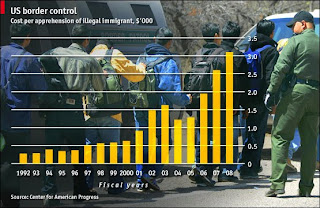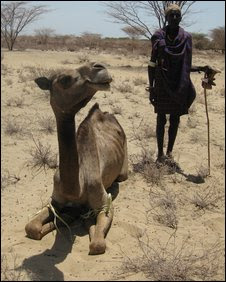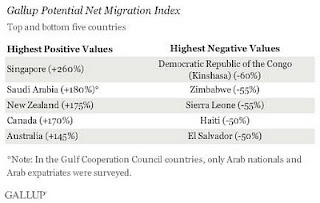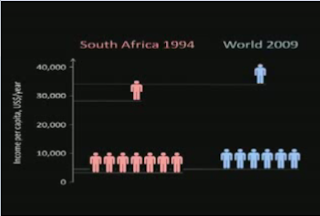In which South Park nails the movie Avatar. It IS Dances with Wolves. But with Smurfs.
29 January 2025
Suburban Superstar
The best part of my morning commute, after BBC Network Africa, and after jumpstarting the heap-of-junk car, and after rally-driving through ditches and river-beds, is the kids. The kids who relentlessly, without fail, coming tearing out of their huts at full pelt towards the road/path screaming and yelling, desperately, wholeheartedly, till their lungs are fit to burst, what is probably the one word that they know of English.
"MORRNNINNGGG!!!!!!"
And the kids who stand shyly by the path until the car window is exactly level with them whereupon they scream with all their enthusiasm and might,
"MORRNNINNGG!!!!!!"
It's slightly less impressive on the evening commute, when despite the apparent passing of the day, the cry is still, a screeching, wholehearted, joyful, "morning". One day they will scream
"EVENINNGGG!!!!!"
and I will be very happy.
"MORRNNINNGGG!!!!!!"
And the kids who stand shyly by the path until the car window is exactly level with them whereupon they scream with all their enthusiasm and might,
"MORRNNINNGG!!!!!!"
It's slightly less impressive on the evening commute, when despite the apparent passing of the day, the cry is still, a screeching, wholehearted, joyful, "morning". One day they will scream
"EVENINNGGG!!!!!"
and I will be very happy.
28 January 2025
Markets in Everything
Footballers bribed officials to play for China, newspaper alleges
200,000 yuan (£18,000) buys international call-up, claims Shangai report, as sports minister says corruption is deeply rooted
26 January 2025
Links
1. Why you should be angry about waste and inefficiency and corruption: His name is Khot.
2. Clemens on migration as the best way to help Haitians.
4. Statistics in the media.
5. Paul Romer on how to prevent skilled emigration weakening domestic policy in Jamaica: give voting rights to the diaspora.
6. UK Foreign Policy Watch: It's time we owned up to horrific abuses to Kenyans during the Mau Mau uprising.
7. Bad Contracting:
9. Richard Dowden has a quasi-blog at the Royal African Society (no RSS feed)
2. Clemens on migration as the best way to help Haitians.
To say that we shouldn't because it wouldn't be the end-all solution is like saying that a lifeboat shouldn't fill its ten empty seats just because there are 100 people in the water.3. Juba Diary: Part 3.
4. Statistics in the media.
5. Paul Romer on how to prevent skilled emigration weakening domestic policy in Jamaica: give voting rights to the diaspora.
6. UK Foreign Policy Watch: It's time we owned up to horrific abuses to Kenyans during the Mau Mau uprising.
7. Bad Contracting:
for years the state department had only one person in Iraq monitoring invoices during the early stages of the DynCorp contract, despite the complexity of the paperwork.8. The Newest Security Contractors in Iraq: Ex-combatants from Sierra Leone
This meant many invoices were not questioned and as a result there is "no confidence in the accuracy of payments of more than $1bn to DynCorp", the report says."
9. Richard Dowden has a quasi-blog at the Royal African Society (no RSS feed)
25 January 2025
Haiti stat of the day
"In 2008, remittances exceeded half the GDP in ... Haiti"From Dilip Ratha writing in Finance & Development
24 January 2025
On building effective states
The Charter Cities blog has a bit of an extended advert for Crown Agents discussion on experience in outsourcing customs administration.
"Outsourcing customs management to Crown Agents succeeded in dramatically increasing customs revenue. In Angola, revenue jumped more than 50% in the first year of operation (2001), doubled in two, and tripled by 2004, a time during which oil prices remained low and Angola lowered tariffs to meet GATT commitments. Mozambique saw a similar increase. In Bulgaria, revenues jumped 19% the quarter in which the Crown Agents-led teams began operation....
Countries can take on otherwise intractable institutional challenges when they invite the help of outsiders. In the case studies described here, countries leveraged external institutions to tackle corruption in the collection of customs. In so doing, the governments enhanced revenue streams and gave themselves additional capacity with which to address chronic underfunding of public investment or other obstacles to sustained economic development.Great! Just make sure that you have the capacity to write a decent contract so you don't get ripped off, and then make sure that your new improved revenues don't create conflict over control of the State; as Acemoglu says in a new paper;
"Because the availability of more efficient means of taxation increases the potential benefits of controlling state power, it also intensifies costly political conflict aimed at capturing the control of the state. This indirect effect counteracts the benefits from more efficient taxation and may dominate the direct benefits."
The Cost of US Border Control
Posted by
Lee Crawfurd
0
comments
 Links to this post
Labels:
economics,
migration,
Policy,
politics,
United States
Links to this post
Labels:
economics,
migration,
Policy,
politics,
United States
Herd Insurance
From the BBC
A new insurance scheme has been launched in northern Kenya which offers herdsmen a chance to protect their livestock against drought.Awesome. Southern Sudan could really use this, there is a huge stock of wealth stored in cattle.
...
The animals are for many people the equivalent of their bank account, so insuring their herds may be a way of avoiding future economic crises.
Hat-tip: TH
20 January 2025
Dear NGOs, Put some clothes on you scruffs!
"The Ministry of Health have asked me to request that NGO staff consider the appropriateness of their attire when visiting the MoH for meetings e.g. where possible avoid wearing shorts/combats/flip-flops to avoid any unnecessary embarrassment in such situations."
Juba School
A friend is supporting a local primary school here in Juba. Many of the kids come from IDP families, and the teachers have been working without pay for years. She recently managed to persuade Borders USA to donate some books to create a school library, which were handed over at the end-of-year ceremonies. How about that for good corporate publicity!
Donations are welcome, but transport is also a constraint. There are already piles of donated stuff in New York and London waiting to be brought to Juba - if anyone is heading over with spare luggage space any help is welcome!
18 January 2025
Elbadawi on the "Game" between Juba and Khartoum
I think the outcome is likely to be one of two extreme: should the broad coalition succeed [between SPLM and northern opposition parties], I think we will have a post-conflict democracy that might succeed in keeping the country united, or at least deliver a peaceful confederal system between north and south; or, instead, we could have an inter-state war followed by very conflictive relationship between the two nascent Sudanese states. In this context both the ICC threat hanging over the President of Sudan and the vulnerability of the south would, in my view, tip the balance of power in the NCP toward the hardliners, who favor confrontation with the SPLM and suppression of the northern opposition.via Shanta Devarajan, World Bank Chief Economist for Africa.
The original paper here.
16 January 2025
10 Questions for 2010
I've been doing a bit of a spring-clean and found a few questions I've been musing over during the past year, half thinking about blogging, but googling in vain. Anyone know anything? Numbers are preferred, but I'd love to hear your thoughts either way.
1. Will increasing urbanisation in Africa improve growth? Is there a relationship between population density or city size and productivity in Africa?
2. What are the determinants of rich country citizen attitudes to aid? Do media debates such as Easterly vs Sachs vs Moyo have any impact?
3. What are the determinants of rich country citizen attitudes to immigration?
4. There are huge gains to "trade" from migration, however as with trade in goods there are winners and losers. Is it possible to compensate the losers and therefore allow for the capture of some of these gains?
5. What is the relationship between barriers to migration and the length of stay? What about internal migration?
6. What are the precise mechanics of aid fungibility? Is there a strategic interaction between government and donors? How do transparency efforts on each side affect this interaction?
7. Is there any evidence for Collier's assertion about a positive relationship between country population size and media quality? Is it even possible to measure media quality?
8. Are there any good cross-country measures of gay rights, and if so what are their correlates?
9. Are there any measures of the danger of countries for tourists? Tourist deaths per tourist? Would publicizing such data affect decisions? Is there an unfair bias against tourism to developing countries due to an incorrect perception of danger?
10. Will there ever be enough data?
1. Will increasing urbanisation in Africa improve growth? Is there a relationship between population density or city size and productivity in Africa?
2. What are the determinants of rich country citizen attitudes to aid? Do media debates such as Easterly vs Sachs vs Moyo have any impact?
3. What are the determinants of rich country citizen attitudes to immigration?
4. There are huge gains to "trade" from migration, however as with trade in goods there are winners and losers. Is it possible to compensate the losers and therefore allow for the capture of some of these gains?
5. What is the relationship between barriers to migration and the length of stay? What about internal migration?
6. What are the precise mechanics of aid fungibility? Is there a strategic interaction between government and donors? How do transparency efforts on each side affect this interaction?
7. Is there any evidence for Collier's assertion about a positive relationship between country population size and media quality? Is it even possible to measure media quality?
8. Are there any good cross-country measures of gay rights, and if so what are their correlates?
9. Are there any measures of the danger of countries for tourists? Tourist deaths per tourist? Would publicizing such data affect decisions? Is there an unfair bias against tourism to developing countries due to an incorrect perception of danger?
10. Will there ever be enough data?
Apartheid
This is the killer graph from this recent Michael Clemens talk on labour mobility.
The ratio of rich country citizens to poor country citizens in the world today is roughly similar to the ratio of whites to blacks in 1994 South Africa. Lifting apartheid in South Africa has kickstarted the process of convergence. Incomes for blacks are now catching up incomes for whites. Image what lifting global apartheid could do.
True globalisation means extending opportunity to people born without it but who deserve it just as much as me.
Subscribe to:
Posts (Atom)





